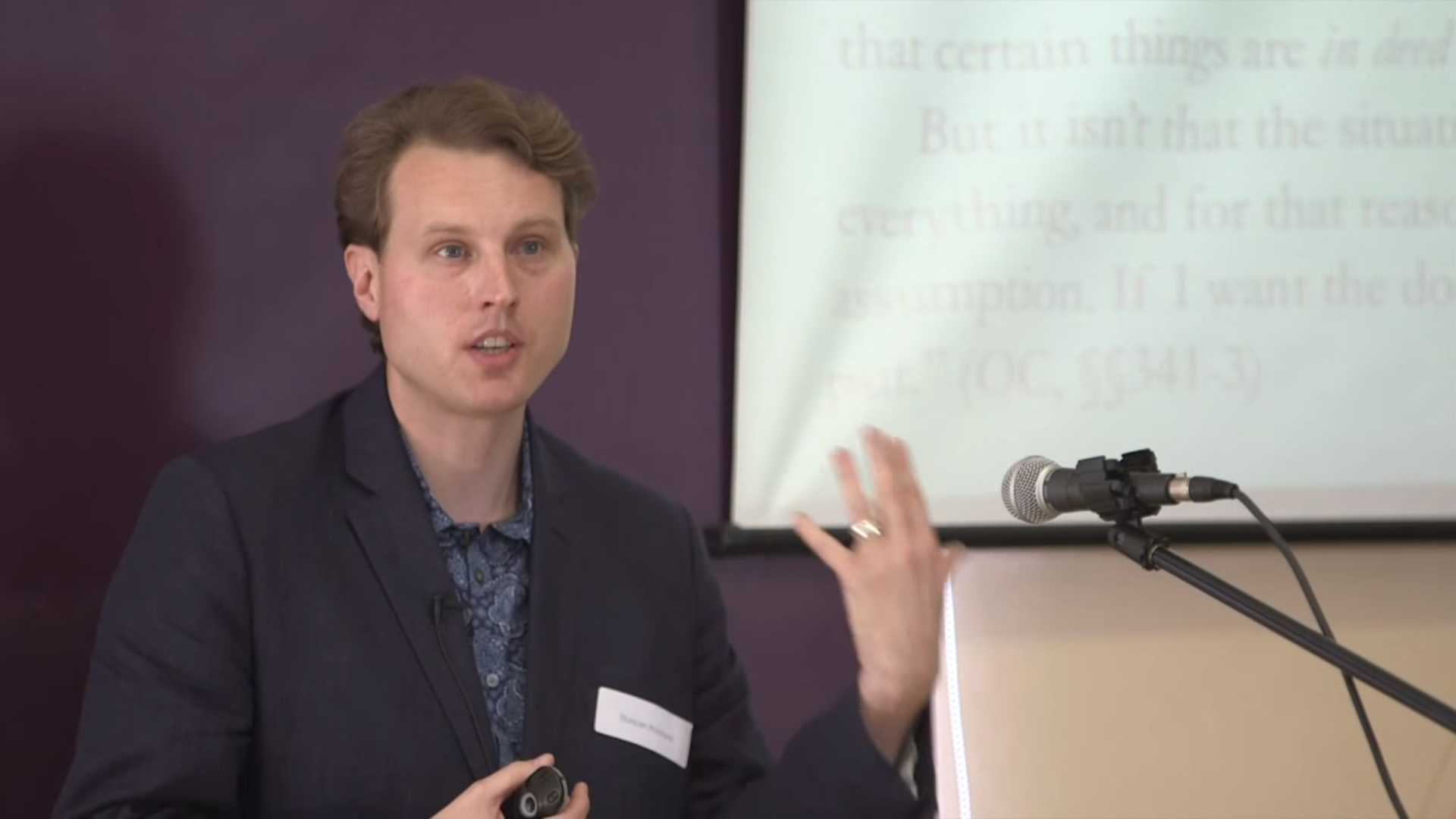Interview with Professor of Philosophy Duncan Pritchard
Professor Duncan Pritchard is the Chair in Epistemology in the University of Edinburgh since 2007 and the Director of Edinburgh’s Eidyn research centre. Before joining the Philosophy department of the University of Edinburgh, he was Professor of Philosophy at the University of Stirling.
In 2007 he was awarded the Philip Leverhulme Prize and in 2011 he was elected to a Fellowship of the Royal Society of Edinburgh.
Professor Pritchard’s research is mainly in epistemology, and his books include Epistemic Luck (Oxford UP, 2005), The Nature and Value of Knowledge (Oxford UP, 2010), Epistemological Disjunctivism (Oxford UP, 2012), and Epistemic Angst (Princeton UP, 2015).
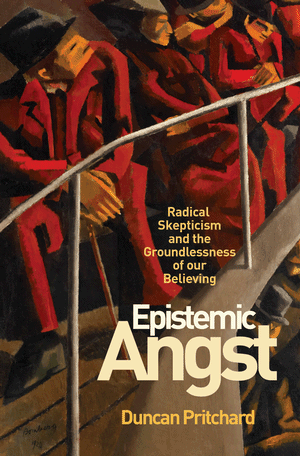
- Professor Pritchard, what is this thing called ‘’Knowledge’’?
As it happens, I have my own particular view about the nature of knowledge, at least as regards propositional knowledge (i.e., knowledge that such-and-such is the case, like knowledge that Paris is the capital of France). I call this proposal anti-luck virtue epistemology. On this view, knowledge involves an interplay between two factors. The first is the avoidance of high levels of epistemic luck or risk that one can’t have knowledge if one could very easily have been wrong. This means that knowledge entails non-lucky (/non-risky) true belief. The second is the manifestation of significant levels of cognitive agency in the forming of this non-lucky true belief, such that one’s cognitive agency plays a significant explanatory role in why one has a non-lucky true belief. I think this proposal can accommodate our intuitions about the intension and extension of knowledge much better than competing accounts, such as pure forms of virtue epistemology (though it should be admitted that my view, like all theories of knowledge, is controversial).
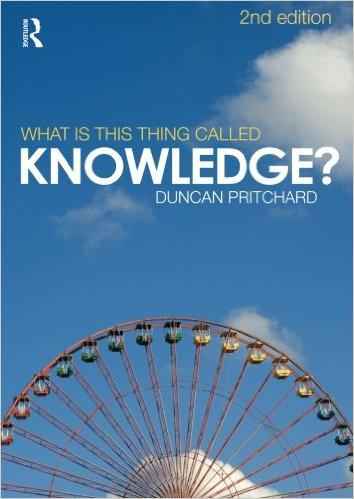
- How can academic philosophy be valuable for a (modern) society?
Not all academic philosophy will be valuable for society at large (modern or otherwise), and I think that’s fine. Some inquiries are worth undertaking for their own sake, regardless of their utility. But there are lots of philosophical projects that are relevant to society, and modern society in particular. Let me give you two inter-related examples, both of which concern philosophical issues dear to my heart.
I think a very important question that epistemologists can tackle concerns the epistemic goals of education. One key element of education must be the epistemic development of the student after all. What does this mean? I think many suppose that education is about drilling facts and skills into students, but a moment’s reflection that this is not really what we’re after. In particular, I contend that it becomes clear on reflection that what we really want to develop in students are their intellectual virtues, the refined character traits that will enable them to become good inquirers. This includes such traits as being open-minded, receptive to evidence (including evidence that goes against what they believe), being conscientious in how they evaluate evidence, being intellectually humble (rather than dogmatic), and so on. A student who acquires these skills will be far better off than one who simply develops their memory of a range of facts.
The second issue concerns the epistemological ramifications of contemporary cognitive science for society at large. For example, I think that the manner in which we are increasingly technologically embedded within our environment suggests that we are now regularly in a situation in which our cognitive processes extend well beyond our ‘on-board’ resources (our memory etc.,) to take in the technology itself. That is, I think we are effectively cognitively offloading a lot of the cognitive tasks we might have hitherto undertaken by our on-board cognitive resources by employing technology. (For readers of my age group, think of how many phone numbers you used to know, and compare how many you know now). I think that as the technological revolution gains pace, we will increasingly find that our cognitive processes are ‘extended’ in this way, and that will require us to consider, as a society, what the epistemic credentials of these new ways of processing information are.
I said that these two topics were inter-related, and I hope it will be clear to the reader why. Education, after all, is also now increasingly undertaken in technologically-embedded environments, and so extended cognition has become part-and-parcel of contemporary educational practices (and this will only increase in future years). If we thought the epistemic goal of education was just to amass facts and basic cognitive skills, then the future of education would be mysterious. After all, we are not far off a technological point –neuromedia, as it is known- whereby facts (putative facts anyway) will be instantly accessible, and many skills (e.g., driving a car, doing accounts, speaking a foreign language) are cognitively off-loaded to technology. I think that in such a world it will be even more important that students develop their intellectual virtues, so that they can make the best use of the massive increase of information that will be readily accessible to them. In contrast, the A1 student of old, who merely had an excellent memory, will not prosper in such an educational environment at all.
- Does a philosopher as a professional thinker have the moral duty to analyze or at least to express publicly his/her thoughts about a major world / local crisis? E.g. the refugee crisis or the ‘’Brexit’’ referendum. And what is your opinion about the refugee crisis and Europe’s handling of the issue?
I think it would be dangerous to insist that every philosopher has such a duty, for a number of reasons. Let me give you an example. I regularly teach philosophy of religion, but I think it is very important that the students don’t have a clue where I stand on this, as that really is besides the point of the intellectual exercise that we are undertaking. (Indeed, I think it would actually harm this intellectual exercise if the students know too much about where I stand, something which really shouldn’t matter one way or another). That’s not to say that philosophers should hide their convictions, but I think revealing them is something that should be done with care, as it can undermine the educational goals that they have set themselves. Moreover, we should always remember that some groups are given a hard time for their personal views. If we’re honest, it’s far easier for a professional academic to admit to being agnostic/atheist than, say, Muslim or Catholic. And what applies to religion in this example can easily apply to politics, of course.
But all of that is consistent with the idea that some philosophers have duties of this kind (or that all philosophers have some kind of general, prima facie duty of this kind). Indeed, it would be bizarre if philosophy as a whole never involved political engagement of the kind you envisage. For what it is worth, I voted against Brexit and was incredulous that it happened (I think most of the people who voted for it were surprised too). I really hope it doesn’t come to pass and that we regain our senses. We live in an increasingly interconnected world, and so these appeals for isolation strike me as backward looking and depressing. On the refugee crisis, I think we need to remember that many of these problems have been caused by western powers interfering in the Middle East and northern Africa in ham-fisted ways, which means that we have a moral responsibility towards the refugees that have been created as a result.
- Over the last few decades mass media have played a dominant role in covering news and political debates but also in terms of propaganda by influecing the views of billions of people all over the world. How can we know which sources of information are reliable and trustworthy? Which (intellectual) virtues are necessary for a citizen of the world?
This goes back to my point earlier about the importance of the intellectual virtues all of them to the educational enterprise. The issue here isn’t merely epistemic either, as I think that such critical skills are vital to being a good citizen.
- What is the main interest and scope of your Philosophical investigations?
I’m interested in everything epistemic, so that means that I have worked on such issues as: scepticism, disagreement, testimony, the theory of knowledge, understanding, perceptual knowledge, epistemic contextualism, epistemic relativism, epistemic value, etc. Beyond epistemology, I’m interested in the nature of luck and risk, and in the meaning of life, especially the preconditions for a meaningful life. These interests are not disconnected. As I explained earlier, I think luck and risk are crucial to understanding central epistemic concepts like knowledge, but they are also crucial to understanding what constitutes a meaningful life. As, indeed, is having a correct understanding of the nature of knowledge and an assurance that we can resist the sceptical claim that most of our putative knowledge is illusory.
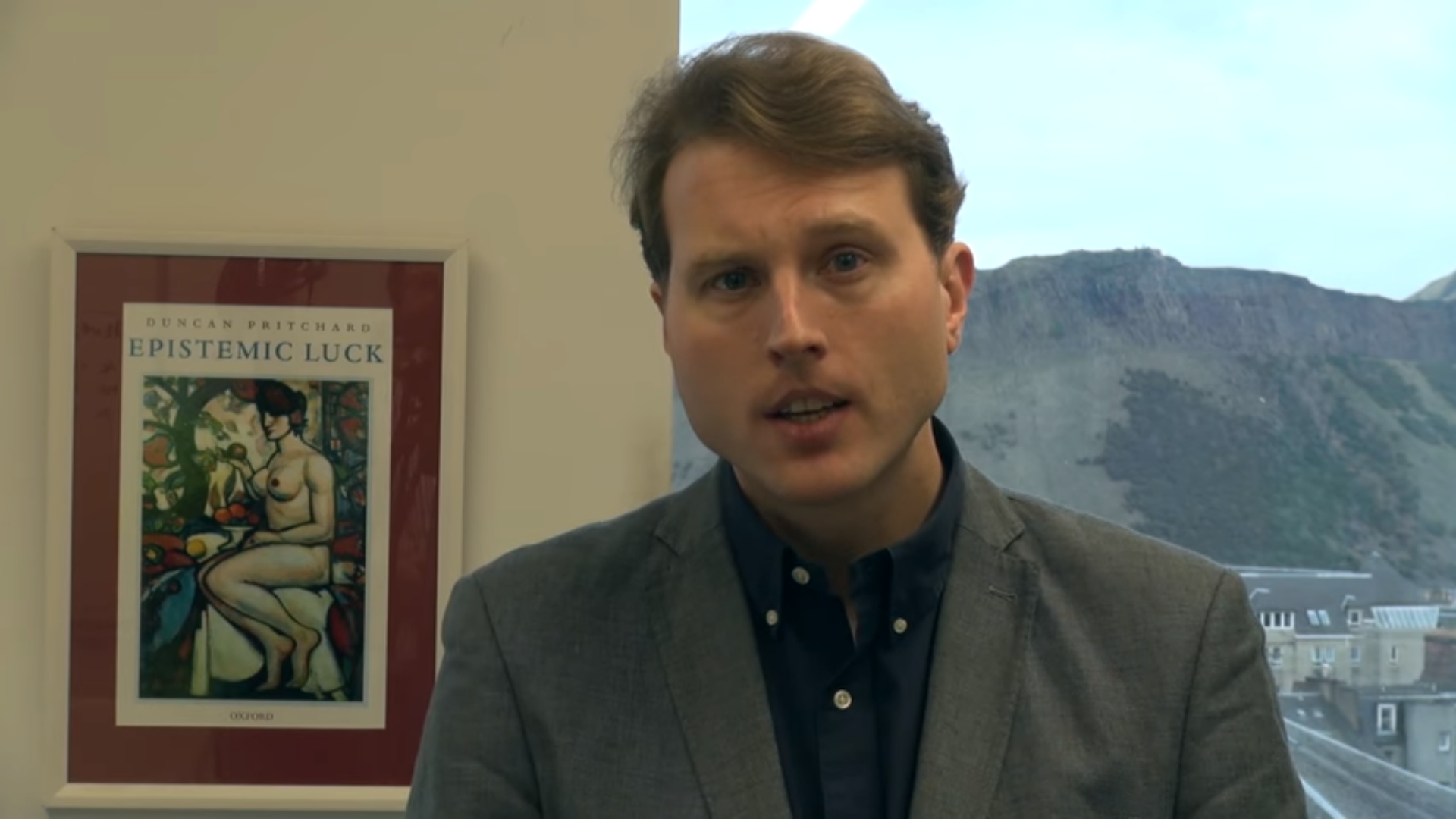
- Which are the main figures / thinkers that have influenced your thought?
Wittgenstein has been a huge influence on me, although I am discovering that the main thread of his thought that has so excited me (from his final notebooks, published as On Certainty) in fact seems to come from John Henry Newman, so perhaps he should get more of the credit. Historically speaking, I am also indebted to Aristotle and to the ancient Pyrrhonian sceptics (the latter didn’t write any books themselves, of course, but we have Sextus Empiricus, and to a much less extent some other commentators, to fill us in about their views). I’m also a big fan of Hume.
In terms of contemporary figures, like all epistemologists I am hugely influenced by Ernie Sosa, whose towering work in the field informs a great deal of inquiry, to the extent that he is now part of the intellectual background against which one operates. In terms of other figures, my thinking about radical scepticism is one of the problems that has been central to my work and has been heavily influenced by pioneering work by such figures as Stanley Cavell, Marie McGinn, Michael Williams, Barry Stroud, and Crispin Wright. I should also mention Linda Zagzebski, since I think her book Virtues of the Mind is a classic the field.

A statue of David Hume in Edinburgh, Scotland.
- Do you think that machines will ever know or understand the world in a way similiral to human intelligence? Are sci-fi scenarios -which present robots with human-like emotions (‘’I the robot’’, ‘’Space Odyssey’’, etc)- any realistic or even possible to come true in the future?
I think we are incredibly close to there being machine intelligence that supersedes human intelligence. One of the issues to bear in mind here is that we are comparing two very different kinds of intelligence, and hence it is hard to make comparative assessments (to the extent that machine intelligence may have already superseded human intelligence, depending on how we evaluate the two). In any case, I think we are on the cusp of an incredibly exciting, and perhaps dangerous, time. In fact, I’m rather puzzled that there has been so little public apprehension of this fact. The general view seems to be that we will focus on this issue once we cross the threshold. And yet it seems pretty clear to me that the Rubicon has already been crossed on this score (or, at least, that the relevant cogs are in motion)! There’s no going back now; what will be, will be.
- Do you prepare any new books for publication? Which one of your books would you recommend for a beginner in Philosophy?
For the first time in my professional career I’m not under contract for a monograph, and I’m not even sure what my next monograph will be, so that’s quite exciting. I am still working on textbooks, as I think it is important to be able to write philosophy in a way that can engage with the general reader (this is why I was involved in spearheading the development of the first MOOCs, or massive open online courses, in philosophy). If you want a very accessible treatment of philosophy, then check out What is this Thing Called Philosophy? (Routledge). I edited this book (and contribute the section on epistemology), and I’m very proud of it.
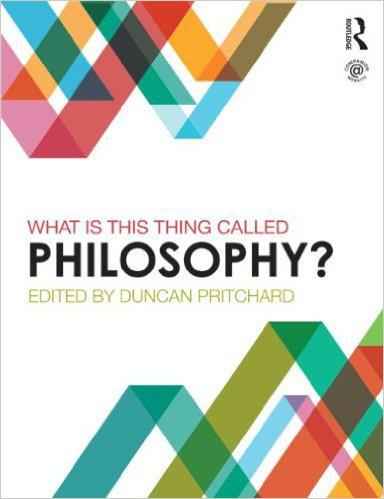
- The department of Philosophy in the University of Edinburgh is considered one of the best Philosophy departments in the UK and in the whole world. What is the recipe of success and what should a new Philosophy student expect to experience in the UoE?
We’ve been very lucky in recent years, in that the University has heavily invested in our department, and this has led to a virtuous cycle, in that we produce good research, do lots of public engagement work (e.g., our MOOCs, that I mentioned earlier), and gain high-profile grants, which leads to more appointments, etc. One of the big innovations recently has been the establishment of new research centre, Eidyn (www.eidyn.org), which I founded in 2012. This has been incredibly successful, not just in terms of the external research income that it has generated, but in terms of its societal impact, such as our very successful ‘Philosophy in Prisons’ programme (https://eidyn.ppls.ed.ac.uk/project/philosophy-prisons). Having Eidyn represent our research has been what’s enabled us to grow in recent years, and was also pivotal to our recent very successful submission to the REF (the research assessment framework in the UK; we came top in Scotland for the volume of high-quality research that we produce and 2nd in the UK, behind Oxford). I hope we can keep up this record of success.
Edinburgh is a great place to be an undergraduate, whatever your subject. It’s a wonderful city, and culturally one of the best in the UK. Philosophy postgraduate students will benefit from all the great research that is going on here, and all the activity that goes with it—a constant stream of seminars, workshops, conferences and such like. It’s a very exciting place to be a researcher.

A panoramic photo of the city of Edinburgh
10. Which are your favorite books / films / music artists?
My favourite book of all-time is Graham Greene’s The Power and the Glory. I think it is his masterpiece. I love all of Greene’s books, both the ‘deep’ ones (e.g., The End of Affair) and the ‘pot-boilers’ (e.g., The Tenth Man, which was an aborted film script, and not to be confused with his other fine book, The Third Man). I’m also a massive fan of Patricia Highsmith, J. G. Ballard, Tolstoy, and Dostoyevsky. Highsmith and Ballard in particular are able to transport you to a completely new world, often within a coupe of pages.
I should also declare that I never fail to read a new Stephen King novel. They aren’t as good these days as they once were (though Doctor Sleep, his recent sequel to The Shining, was a return to form I think), but even King at his worst is a way better author than most. I think his popularity obscures his great gift for storytelling.
In terms of films, I love horror movies, and watch far too many of them. What’s odd about this is that I get genuinely scared by them (I cannot have popcorn in my lap at a horror movie, as it will surely go flying). Still, I get a thrill out of this, and even a kind of thrill about being somewhat scared thereafter once the film has finished. (In a similar way, although I’m terrified of heights, I quite like being high up). I guess my favourite horror film is Dario Argenta’s Suspiria (though there are lots of contenders here, such as Nicholas Roeg’s wonderful Don’t Look Now). It really is a feast of the senses.
Growing up, I was nuts about Woody Allen movies. For a while Bananas was my favourite movie, and I think it still stands the test of time (though some scenes reflect a dated moral code). I was also in love with Annie Hall (both the film and the character). Finally, I should mention the film The Naked Gun. Like Bananas (or Woody’s first film, Take the Money and Run, which is also hilarious), I’ve watched it so very many times, and it never fails to cheer me up. If anyone made the movie of my life¾and why would they?¾then Leslie Nielsen would be ideal. Not the Leslie Nielsen of Naked Gun though, but the earlier Nielsen who played straight roles (such that one can’t even watch him now without laughing). In particular, he was the captain of the ship in the Poseidon Adventure, if memory serves standing to attention as the water started to swell at his feet. That Leslie Neilson could play me to perfection!
When it comes to music, I’m afraid that I’m mostly stuck in a time-warp. I still listen to the music of my youth: Morrissey, The Fall, Bauhaus, Nick Cave, Echo and the Bunnymen, and so on. My favourite song of all-time is Morrissey’s Now My Heart is Full (his tribute to Greene, as it happens), though Bowie’s Young Americans is a close second. Don’t get me wrong, I try new material all the while, but regression to the mean seems to be the order of the day when it comes to my musical taste. (My wife tries to convince me of the virtues of classical music, but I prefer my mean).

